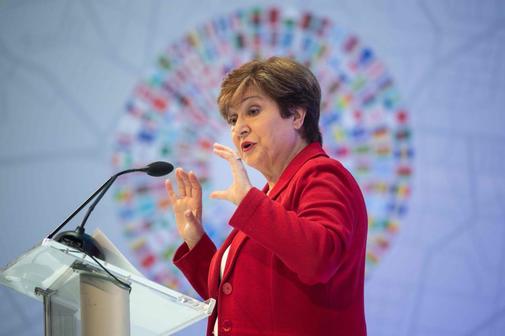- Davos: The Spanish Royal House, the only European monarchy without a presence in Davos
- Fresh Money.Sanchez turns to Davos to try to "give confidence" to multinationals
The International Monetary Fund already reduces to 1.6% the economic growth of Spain after finding that the slowdown is worse than expected last October , according to the report presented this Monday in Davos by the managing director Kristalina Georgieva . The IMF cuts its growth estimates in Spain more than any other Eurozone economy "due to the consequences of a more marked deceleration than expected in domestic demand and exports in 2019". Consequently, it reduces two tenths from the 1.8% estimated last fall to the current 1.6% by 2020. It thus departs from the official government forecast that it still believes that the Gross Domestic Product may grow by 1.8 % in this first year of the legislature.
Within the euro group, the IMF also also cuts, and to a lesser extent, its forecast for Germany , which falls by one tenth and will grow 1.1% this year.
Spain will stop growing more in 2020 than the set of advanced economies (including the US, Canada or the United Kingdom, among others) as in recent years, since the IMF also expects average growth in these leading countries of 1, 6% Yes, it will continue to grow more than the Eurozone average, to which it attributes a 1.3% average increase in its GDP.
By 2021, the IMF also cuts its forecast for Spain by another tenth and believes that it will also not exceed 1.6% as well as the set of advanced economies and slightly above 1.4% of the Eurozone.
The general diagnosis of the IMF is that the world economy continues to rebound, but with a downward revision. "The forecast is that global growth, which according to estimates was 2.9% in 2019, increases to 3.3% in 2020 and 3.4% in 2021 ; that is, a downward revision of 0.1% for 2019 and 2020 and 0.2% by 2021, compared to the figures presented in the October issue of World Economy Outlook, "says the institution. "The downward revision is mainly due to unexpected negative results of economic activity in a few emerging market economies, particularly India, which led to a revaluation of growth prospects for the next two years." Also referring to countries like Chile, he notes that "in a few cases, this revaluation also takes into account the impact of the greater social unrest."
The IMF points out as positive elements "the general reorientation towards an accommodative monetary policy" of central banks; "the intermittently favorable news about the trade negotiations between the United States and China"; "and for less fears that a Brexit will occur without agreement."
As recipes to combat the slowdown, Georgieva recommends multilateralism and cooperation between the powers, which will be one of the main messages of the World Economic Forum in this week in which the visit, among others, of the president of the United States, Donald Trump
From the IMF report it follows that its technicians share part of the program of the new Spanish Government, aimed at correcting inequalities and "inclusive growth", but not if that implies more public deficit. "Unless private demand is very weak, countries with high levels of debt should generally carry out consolidations [deficit cuts via less expenses or more income] in order to be prepared for the next slowdown and benefit spending that is coming, "he says. Instead, he insists that sanitation companies like Germany should "increase spending on initiatives that promote productivity growth, in areas such as research, training and physical infrastructure."
As for the US, "growth is expected to moderate from 2.3% in 2019 to 2% in 2020 and then to 1.7% in 2021 (0.1% less in 2020 compared to October). Moderation it is due to a return to a neutral fiscal orientation and the diminishing momentum derived from the relaxation of financial conditions. "
On Latin America, "growth is expected to recover from an estimated 0.1% in 2019 to 1.6% in 2020 and 2.3% in 2021 (0.2 and 0.1% less than in October)." He attributes the downward revisions "due to a cut in Mexico's growth prospects in 2020-21, among other reasons for the continued weakness of the investment, and to a significant downward revision of the growth forecast for Chile, which has been affected by social tension. " The counterpoint is Brazil . "These revisions are partly offset by an upward revision of the 2020 forecast for Brazil, thanks to an improved attitude after the approval of the pension reform and the dissipation of disturbances."
"Growth in China is projected to decrease slightly from the estimated 6.1% for 2019 to 6.0% in 2020 and 5.8% in 2021," better than estimated in autumn by the glimpses of distension in the commercial war with USA.
According to the criteria of The Trust Project
Know more- IMF
- Spain
- Chile
- China
- Brazil
- Germany
- Mexico
- GDP
- U.S
- United Kingdom
- India
- Donald Trump
- Davos
- Canada
TelecommunicationsThe global mobile association highlights the rise of Huawei in 2019, "a tough warning for Samsung and Apple"
2010-2019The unpredictable decade that turned the world upside down
Interview Thier Breton: "The big tech companies will have to adapt to European regulations"

